

Apò mēkhanḗs theós. LogicKo. 100th Meme Keys. Top 100 Speeches of the 20th Century by Rank. The secret to creativity, intelligence and scientific thinking: Being able to make connections. 10.3K Flares Filament.io 10.3K Flares × When we shared this image from the @buffer Twitter account recently, it got me thinking.
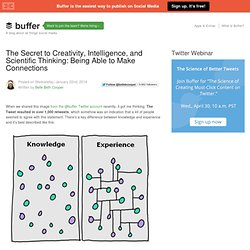
The Tweet resulted in over 1,000 retweets, which somehow was an indication that a lot of people seemed to agree with this statement. There’s a key difference between knowledge and experience and it’s best described like this: The original is from cartoonist Hugh MacLeod, who came up with such a brilliant way to express a concept that’s often not that easy to grasp. The image makes a clear point—that knowledge alone is not useful unless we can make connections between what we know. Lots of great writers, artists and scientists have talked about the importance of collecting ideas and bits of knowledge from the world around us, and making connections between those dots to fuel creative thinking and new ideas. Pax Humanitas. Spiritual Succor. Grok Ko. Transcendence. संस्कृतम्
Big Questions Online. Albert Einstein Institution. Metacognition: The Gift That Keeps Giving. Editor's note: This post is co-authored by Marcus Conyers who, with Donna Wilson, is co-developer of the M.S. and Ed.S.
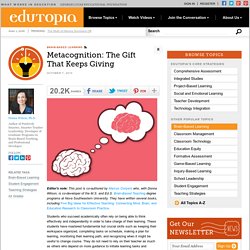
Brain-Based Teaching degree programs at Nova Southeastern University. They have written several books, including Five Big Ideas for Effective Teaching: Connecting Mind, Brain, and Education Research to Classroom Practice. Students who succeed academically often rely on being able to think effectively and independently in order to take charge of their learning. These students have mastered fundamental but crucial skills such as keeping their workspace organized, completing tasks on schedule, making a plan for learning, monitoring their learning path, and recognizing when it might be useful to change course. They do not need to rely on their teacher as much as others who depend on more guidance to initiate learning tasks and monitor their progress. Magic and Mystery, Chaos and Complexity.
Paradox My dictionary says a paradox is a seemingly absurd or contradictory statement even if it is well founded.
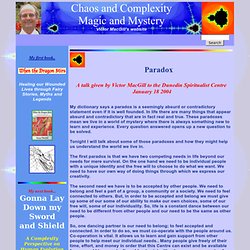
Manuel Lima on the Power of Knowledge Networks in the Age of Infinite Connectivity. DIKW Pyramid. The DIKW Pyramid, also known variously as the "DIKW Hierarchy", "Wisdom Hierarchy", the "Knowledge Hierarchy", the "Information Hierarchy", and the "Knowledge Pyramid",[1] refers loosely to a class of models[2] for representing purported structural and/or functional relationships between data, information, knowledge, and wisdom.
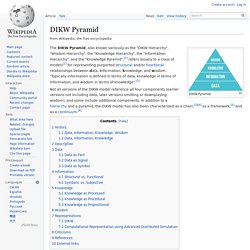
"Typically information is defined in terms of data, knowledge in terms of information, and wisdom in terms of knowledge".[1] History[edit] "The presentation of the relationships among data, information, knowledge, and sometimes wisdom in a hierarchical arrangement has been part of the language of information science for many years. Although it is uncertain when and by whom those relationships were first presented, the ubiquity of the notion of a hierarchy is embedded in the use of the acronym DIKW as a shorthand representation for the data-to-information-to-knowledge-to-wisdom transformation.
Data, Information, Knowledge, Wisdom[edit] Description[edit] Data[edit] The Problem with the Data-Information-Knowledge-Wisdom Hierarchy - David Weinberger. By David Weinberger | 9:00 AM February 2, 2010 The data-information-knowledge-wisdom hierarchy seemed like a really great idea when it was first proposed.

But its rapid acceptance was in fact a sign of how worried we were about the real value of the information systems we had built at such great expense. What looks like a logical progression is actually a desperate cry for help. The DIKW hierarchy (as it came to be known) was brought to prominence by Russell Ackoff in his address accepting the presidency of the International Society for General Systems Research in 1989. ProbSolv Research, Finney. Information Overload's 2,300-Year-Old History - Ann Blair. By Ann Blair | 10:45 AM March 14, 2011 We’re all worried about the costs of information overload and we typically associate these problems with new digital technologies.
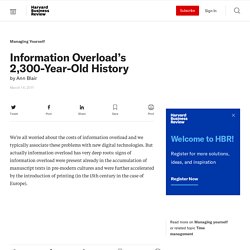
Data, Information, Knowledge and Wisdom. From SystemsWiki by Gene Bellinger, Durval Castro, Anthony Mills There is probably no segment of activity in the world attracting as much attention at present as that of knowledge management.
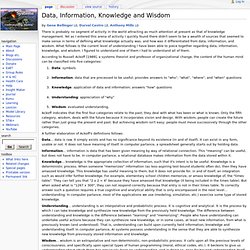
Yet as I entered this arena of activity I quickly found there didn't seem to be a wealth of sources that seemed to make sense in terms of defining what knowledge actually was, and how was it differentiated from data, information, and wisdom. How to Cultivate Collective Intelligence. The first time I heard the word "swarming" in a business context, it made me chuckle. I had an instant visual of bees dressed in suits and carrying briefcases, furiously buzzing over, under, and around a conference table. They weren’t accomplishing anything—just making a lot of noise and looking for something to sting. Collective Intelligence: Creating a Prosperous World at Peace.
Lego Serious Play at CERN, Challenge Based innovation. CBi is the latest iteration of an evolving experiment at CERN in Geneva.
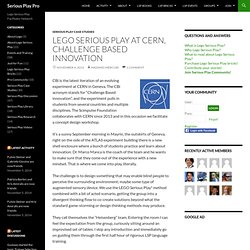
The CBi acronym stands for “Challenge Based innovation”, and the experiment pulls in students from several countries and multiple disciplines. The Scimpulse Foundation collaborates with CERN since 2013 and in this occasion we facilitate a concept design workshop. The Nature of Consciousness: How the Internet Could Learn to Feel - Steve Paulson. "Romantic reductionist" neuroscientist Christof Koch discusses the scientific side of consciousness, including the notion that all matter is, to varying degrees, sentient.
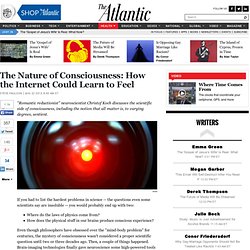
If you had to list the hardest problems in science -- the questions even some scientists say are insoluble -- you would probably end up with two: A Brief Guide to Embodied Cognition: Why You Are Not Your Brain. Embodied cognition, the idea that the mind is not only connected to the body but that the body influences the mind, is one of the more counter-intuitive ideas in cognitive science.
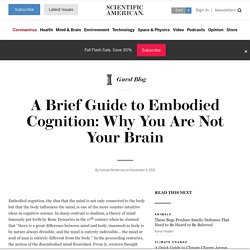
In sharp contrast is dualism, a theory of mind famously put forth by Rene Descartes in the 17th century when he claimed that “there is a great difference between mind and body, inasmuch as body is by nature always divisible, and the mind is entirely indivisible... the mind or soul of man is entirely different from the body.” "Wisdom" Knowledge Management. Emotional intelligence. Emotional Intelligence. Reflection en cours. Psychology. Pearls of Wisdom. 20 Best Life Quotes. 7 Lessons From 7 Great Minds.
Have you ever wished you could go back in time and have a conversation with one of the greatest minds in history? Well, you can’t sorry, they’re dead. Unless of course you’re clairaudient, be my guest. But for the rest of us, we can still refer to the words they left behind. Even though these great teachers have passed on, their words still live, and in them their wisdom. I’ve made a list of seven what I believe are some of the greatest teachings by the world’s greatest minds. 1.
9 Mind-Bending Epiphanies That Turned My World Upside-Down. Over the years I’ve learned dozens of little tricks and insights for making life more fulfilling. They’ve added up to a significant improvement in the ease and quality of my day-to-day life. But the major breakthroughs have come from a handful of insights that completely rocked my world and redefined reality forever.
The world now seems to be a completely different one than the one I lived in about ten years ago, when I started looking into the mechanics of quality of life. It wasn’t the world (and its people) that changed really, it was how I thought of it. Maybe you’ve had some of the same insights. 1. Slow Movement. The Slow Movement advocates a cultural shift toward slowing down life's pace. It began with Carlo Petrini's protest against the opening of a McDonald's restaurant in Piazza di Spagna, Rome in 1986 that sparked the creation of the Slow Food organization. Over time, this developed into a subculture in other areas, such as Cittaslow (Slow Cities), Slow living, Slow Travel, and Slow Design.
Slow design. Slow Design is a branch of the Slow Movement, which began with the concept of Slow Food, a term coined in contrast to fast food. As with every branch of the Slow Movement, the overarching goal of Slow Design is to promote well being for individuals, society, and the natural environment. Slow Design seeks a holistic approach to designing that takes into consideration a wide range of material and social factors as well as the short and long term impacts of the design. Origin and meaning[edit] User-centered design. The chief difference from other product design philosophies is that user-centered design tries to optimize the product around how users can, want, or need to use the product, rather than forcing the users to change their behavior to accommodate the product.
UCD models and approaches[edit] Participatory design. Wicked problems. Q Methodology: A Method for Modern Research. Wicked Problems: Problems Worth Solving - My Epiphany. Wicked Problems. Wickedproblems. Wicked Problems. Wicked Problems. Wicked Problems: Problems Worth Solving - Welcome. Intelligence collective. Toward a Complex Adaptive Intelligence Community. The Octarine argument. Yes, yes - colour corresponds with real properties. ParadigmOfComplexity. Theory of everything. How we change what others think, believe, feel and do. Hard problem of consciousness. The existence of a "hard problem" is controversial and has been disputed by some philosophers.[4][5] Providing an answer to this question could lie in understanding the roles that physical processes play in creating consciousness and the extent to which these processes create our subjective qualities of experience.[3] Several questions about consciousness must be resolved in order to acquire a full understanding of it.
Philosophikos. Think! Esoteric Endeavors.